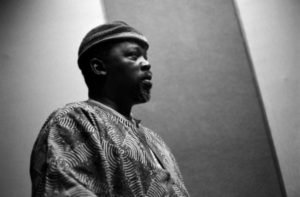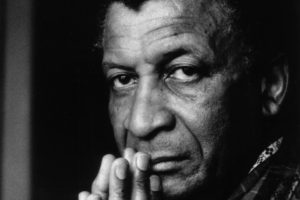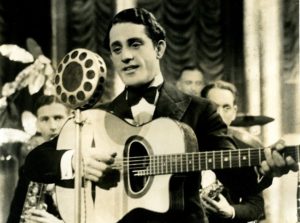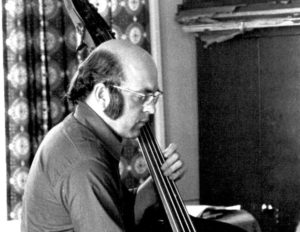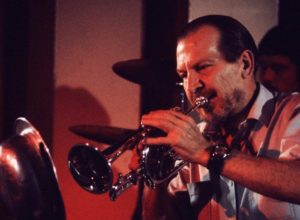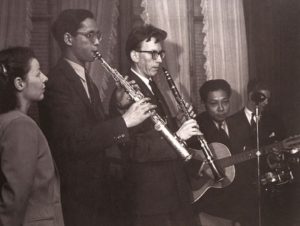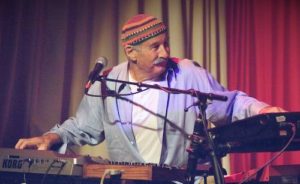Guy Warren
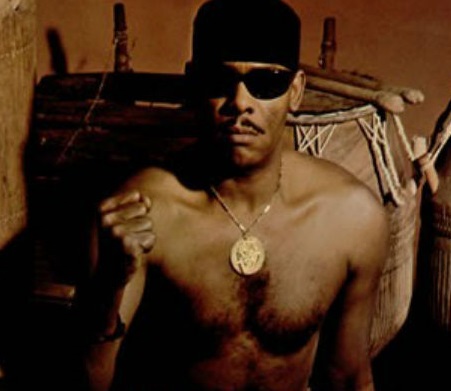
Kofi Ghanaba (1923-2008), who recorded as Guy Warren, is considered the founding father of a movement to reunite (in his words) “African-American jazz with its African roots”. His impact was recognised by musicians like Max Roach, Fela Kuti and Randy Weston, who took inspiration from Ghanaba’s approach to fusing jazz and African traditional music, producing many classic albums in the process. Ghanaba was born Warren Gamaliel Kpakpo Akwei in Accra in what was then the Gold Coast. ‘Warren Gamaliel’ were taken from the given names of the current US president, Warren Gamaliel Harding, who died in office just a few months after Ghanaba’s birth.
He went to the Government Boy’s School in Accra, during which time, he played in the school band. He was drummer with the Accra Rhythmic Orchestra from 1940 alongside brothers Yebuah and ET Mensah. With the onset of the Second World War, he enlisted to work for the USA Office of Strategic Services, a predecessor of the CIA. This gave him his first opportunity to visit Chicago and experience the US jazz scene first hand.
After the war, while still pursuing music, he launched a successful career as a journalist, working as a reporter for the Spectator Daily (and later editor of rival newspapers), and then as broadcaster for the Gold Coast Broadcasting Service from 1944. By this time he had changed his name to Guy Warren. He spent much of 1950 touring the UK as a member of Kenny Graham‘s Afro-Cubists, and playing with London’s strong contingent of Caribbean musicians. He also became the BBC’s first African presenter with a series of programmes about jazz. In 1951, he was back in Accra and reunited with ET Mensah and the group they had formed a few years earlier, The Tempos. Ghanaba brought to that group the influences he had picked up, including jazz, calypso and Cuban rhythms. This heady mixture helped The Tempos develop a revitalised version of highlife that would help earn Mensah the nickname the ‘King of Highlife’.
In 1954, Ghanaba moved to USA, releasing his debut album in the name of Guy Warren – Africa Speaks, America Answers on Decca in 1956. The album features the Chicago-based Red Saunders Orchestra under the direction of multi-instrumentalist Gene Esposito. The music is perhaps the first successful fusion of jazz and African rhythms and anticipates some of Fela Kuti’s future efforts. One of Ghanaba’s compositions ‘Eyi Wala Dong’ from the album would later become a hit for Bert Kaempfert under the name ‘That Happy Feeling’. In New York, he gigged with Erroll Garner, Sarah Vaughan and Lester Young, met Charlie Parker, and jammed with John Coltrane and Thelonious Monk. His next album, Themes For African Drums (RCA Victor 1958) featured Ellington trombonist Lawrence Brown, and included the song ‘Love, The Mystery Of’ included a track, which was recorded under the pointlessly re-rendered title of ‘Mystery of Love’ by Art Blakey in 1962 and by Randy Weston in 1963. The unfortunately titled African Rhythms: The Exciting Soundz of Guy Warren and his Talking Drums (Decca 1962) was recorded in 1959 with a small group including bass player, Richard Davis, and included his drum suite ‘A Third Phase’.
Frustated by the States at this point and convinced that American musicians weren’t understanding his music, he returned to Ghana in 1960, where a live premier of ‘The Third Phase’ at the Accra Jazz Festival was badly recieved. Kwame Nkrumah had just become president of the newly independent Ghana, and he and Warren became friends. He would soon change his name formally to Kofi Ghanaba as a patriotic gesture. After Nkrumah was overthrown in a violent coup d’etat, Ghanaba split his time between Accra and London, where in 1969, he recorded Afro-Jazz with the Don Rendell/Ian Carr Quintet augmented by Indian guitarist Amancio d’Silva. Ghanaba retired from city life in the early 1980s, but helped to set up the Ghanaian Musicians Union, and worked on drum interpretations of classical music. In 1986, he performed with Max Roach at Royal Albert Hall. He acted (and drummed) in the title role of the 1992 film ‘Sankofa’ and also set up a weekly newspaper. He died in 2008, at the age of 85.
Key Recordings:
Africa Speaks, America Answers (Decca 1956)
Themes For African Drums (RCA Victor 1958)
Afro-Jazz (Columbia 1969)
